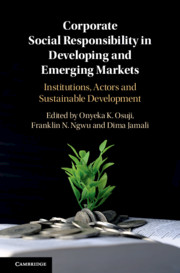 Corporate Social Responsibility in Developing and Emerging Markets
Corporate Social Responsibility in Developing and Emerging Markets Book contents
- Corporate Social Responsibility in Developing and Emerging Markets
- Corporate Social Responsibility in Developing and Emerging Markets
- Copyright page
- Dedication
- Contents
- Figures
- Tables
- Notes on Contributors
- Foreword
- Endorsement
- Preface
- Table of Cases
- Table of Legislation
- 1 Introduction to Corporate Social Responsibility in Developing and Emerging Markets: Institutions, Actors and Sustainable Development
- Part I Institutions, CSR Conceptualizations and Sustainable Development
- Part II CSR and Sustainable Development Cross-Country Studies
- Part III Normative and Utility Perspectives
- 14 Islamic Finance, Sustainable Development and Developing Countries: Linkages and Potential
- 15 Developing Countries’ Business Schools and Socially Conscious Business Leaders
- 16 Corporate Participation in Climate Change Mitigation in Developing Countries: ‘Green Capitalism’ as a Tool for Sustainable Development
- 17 Ethics Issues in Outsourcing to Emerging Markets: Theoretical Perspectives and Practices
- 18 Promoting Sustainability in Business and Management Education
- 19 Sustainable Finance, the Law and Stakeholders: Towards Responsible Social Movements
- 20 Sustainable Consumption, Consumer Protection and Sustainable Development: Unbundling Institutional Septet for Developing Economies
- 21 Corporate Social Responsibility and Sustainable Development in Developing and Emerging Markets: Looking Forward
- References
16 - Corporate Participation in Climate Change Mitigation in Developing Countries: ‘Green Capitalism’ as a Tool for Sustainable Development
from Part III - Normative and Utility Perspectives
Published online by Cambridge University Press: 18 December 2019
- Corporate Social Responsibility in Developing and Emerging Markets
- Corporate Social Responsibility in Developing and Emerging Markets
- Copyright page
- Dedication
- Contents
- Figures
- Tables
- Notes on Contributors
- Foreword
- Endorsement
- Preface
- Table of Cases
- Table of Legislation
- 1 Introduction to Corporate Social Responsibility in Developing and Emerging Markets: Institutions, Actors and Sustainable Development
- Part I Institutions, CSR Conceptualizations and Sustainable Development
- Part II CSR and Sustainable Development Cross-Country Studies
- Part III Normative and Utility Perspectives
- 14 Islamic Finance, Sustainable Development and Developing Countries: Linkages and Potential
- 15 Developing Countries’ Business Schools and Socially Conscious Business Leaders
- 16 Corporate Participation in Climate Change Mitigation in Developing Countries: ‘Green Capitalism’ as a Tool for Sustainable Development
- 17 Ethics Issues in Outsourcing to Emerging Markets: Theoretical Perspectives and Practices
- 18 Promoting Sustainability in Business and Management Education
- 19 Sustainable Finance, the Law and Stakeholders: Towards Responsible Social Movements
- 20 Sustainable Consumption, Consumer Protection and Sustainable Development: Unbundling Institutional Septet for Developing Economies
- 21 Corporate Social Responsibility and Sustainable Development in Developing and Emerging Markets: Looking Forward
- References
Summary
The chapter shows that one way of tackling the problem of weak regulatory systems that allow corporations to ignore environmental sustainability in their business activities is to make corporate investments in environmental sustainability in developing countries economically attractive to the corporations. And in the process enable them to contribute to the achievement of the Sustainable Development Goals in these developing countries, while reaping economic rewards for doing so. ‘Green capitalism’ as a concept merges economic capitalism with green objectives and when appropriately utilised, can be an effective tool for achieving the SDGs in developing countries. This chapter analyses the application of green capitalism in developing countries and how it merges the profit-focus of capitalism with environmental sustainability. Utilising the ‘environment contestation approach’, the chapter examines how ‘green capitalism’ reconciles the notions of free-market enterprise and the sustainable development desired by developing countries. It discusses the regulatory steps needed to prevent potential ‘greenwashing’ by corporations while incentivising increased investments in SDGs-related projects within these jurisdictions. Using available statistics, the chapter examines the success of ‘green bonds’ issuance for environmental projects as a reflection of the increasing reliance on green capitalist tools for achieving the SDGs in developing countries.
Keywords
- Type
- Chapter
- Information
- Corporate Social Responsibility in Developing and Emerging MarketsInstitutions, Actors and Sustainable Development, pp. 315 - 335Publisher: Cambridge University PressPrint publication year: 2019
References
- 2
- Cited by


